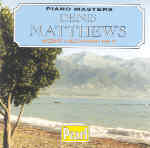Referring in his booklet notes to Denis Matthews’ 1942 recording of Mozart’s A major K. 488 concerto, Roger Beardsley writes that “some may find it uncharismatic or too monochrome.” Perhaps so, although one man’s “monochrome” is another man’s “cool” or “restrained”. Still, even among competing versions on 78s, as self-effacing a Mozartean as Clifford Curzon managed to generate a more singing line and dramatic subtext within his similarly scaled-down conception. And the bracing vitality and congenial soloist/orchestra interplay characterizing Arthur Rubinstein’s delicious late-1940s version with Vladimir Golschmann wipes the floor with Matthews’ clean but deferential pianism (at least he comes alive during his first-movement cadenza). The Liverpool Philharmonic’s strings dominate the winds and retain anachronistic, swoopy slides à la Mengelberg (annoyingly so in the first movement’s second theme).
You can’t deny the sheer digital poise and unflappable symmetry Matthews brings to Mozart’s C major Fantasie and Fugue and the A minor Sonata K. 310, although subsequent shellac interpretations by Schnabel and Lipatti boast distensions of phrase that heighten the composer’s harmonic tension to a greater degree than Matthews reveals.
Matthews’ 1946 Beethoven Op. 109 Sonata is a beauty. He matches Schnabel’s pliable poetry and canny timing in the first two movements while avoiding the older pianist’s tendency to snatch at the Prestissimo’s phrase endings. If Matthews doesn’t quite achieve Schnabel’s introspective, trembling depths in the third movement, and takes the quick, central variation at a relatively cautious clip, his heartfelt playing achieves marvelous textural and linear clarity from which any pianist can learn. The two John Field Nocturnes also receive pellucid, refined performances. Roger Beardsley’s transfers contain a high level of surface noise yet still sound full and realistic.
































